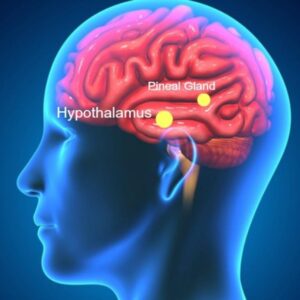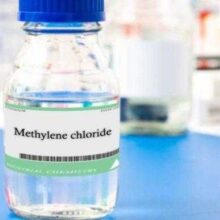Calcification of the Pineal Gland Shows a Strong Correlation in the Developing of Alzheimer’s Disease
 The human brain remains one of the most enigmatic organs, even in today’s age of scientific breakthroughs. Hidden within its intricate networks is the pineal gland, a small yet crucial component often referred to as the “third eye.” Recent discoveries, however, are revealing its deeper significance. Alarmingly, there seems to be a compelling link between the calcification of the pineal gland and the onset of Alzheimer’s disease.
The human brain remains one of the most enigmatic organs, even in today’s age of scientific breakthroughs. Hidden within its intricate networks is the pineal gland, a small yet crucial component often referred to as the “third eye.” Recent discoveries, however, are revealing its deeper significance. Alarmingly, there seems to be a compelling link between the calcification of the pineal gland and the onset of Alzheimer’s disease.
The Mighty Pineal Gland: More Than Just a Tiny Pea
Deep within the labyrinth of the human brain lies a pea-sized gland that, for centuries, has captured the imagination of philosophers, spiritualists, and scientists alike: the pineal gland. Positioned snugly between the brain’s two hemispheres, this tiny organ may be small in stature, but its implications for our overall health and consciousness are profound.
Nature’s Timekeeper: The primary role of the pineal gland is to produce melatonin, a hormone responsible for regulating our sleep-wake cycles. Acting in harmony with the ebb and flow of daylight, it helps orchestrate our body’s internal clock, ensuring restful nights and alert days.
Beyond Sleep: Beyond its role in sleep regulation, the pineal gland has also been linked to a variety of functions that play a role in maintaining our mental health. These include mood modulation, protection against brain aging, and even the synthesis of dreamscapes during our deepest REM cycles.
Spiritual Significance: Historically, many cultures have viewed the pineal gland as a connector between the physical and spiritual worlds. Some ancient civilizations believed it to be the seat of the soul or the source of inner enlightenment.
A Delicate Balance: Like all components of the human body, the pineal gland thrives under certain conditions and is vulnerable to various external factors. Its efficiency can be compromised by things like artificial light, certain chemicals, and, as emerging studies suggest, calcification.
The Pineal Gland and Alzheimer’s: What Research Tells Us
Understanding the intricacies of Alzheimer’s is no walk in the park. It’s a complicated condition that not only affects the brain but has connections with other body organs as well. A recent review published in Molecular Neurodegeneration brought to light the significance of pineal dysfunction in Alzheimer’s pathogenesis:
Reduced Pineal Volume: The study points out that the pineal gland’s reduced volume and its calcification in Alzheimer’s patients can hamper the immune-pineal axis. It’s all interconnected. The melatonin secreted by the pineal and extrapineal organs acts as a bridge, enabling communication between the pineal gland and our immune system.
Sleep Disturbances: A dysfunctional pineal gland can be a sleep wrecker! The study highlights that this dysfunction causes a dip in melatonin production, resulting in poor sleep quality and sleep disturbances in Alzheimer’s patients. Sweet dreams are indeed vital for our brains.
Neurogenesis Goes Haywire: Neurogenesis is the formation of new nerve cells or neurons. Pineal dysfunction is a culprit in inhibiting this essential process in Alzheimer’s brains. It impacts both hippocampal and hypothalamic neurogenesis.
Memory Loss: Last, but certainly not least, all these changes due to pineal dysfunction tie back to the heart-wrenching memory loss associated with Alzheimer’s disease.
Hope on the Horizon: Potential Solutions
It’s not all doom and gloom. Science is continually evolving, and researchers are hard at work finding ways to address these challenges:
Epigenetic Trials: One exciting approach is the use of epigenetic trials. A particular study points towards the potential of valproic acid (VPA) to epigenetically regulate the pineal gland’s function. This acid can boost the expression of the melatonin receptor in our brains. Science is incredible, right?
RNA Regulation: Delving deeper into the cellular level, the study mentions the role of noncoding RNAs, like miR-325-3p. These can be pivotal in controlling melatonin secretion by influencing the expression of Aanat genes in the pineal gland. In simpler terms, tweaking these tiny molecules can help address the root issues at hand.
Holistic Hacks for a Happy Pineal Gland
Research has shown that lifestyle factors can influence the calcification rate of the pineal gland. Excessive fluoride consumption is considered a risk factor as it tends to accumulate in the pineal gland, leading to faster calcification. Fluoride has also been found to decrease melatonin production, which has negative effects on our overall health.
Besides excessive fluoride consumption, a poor diet laden with preservatives, chemicals, and pesticides can contribute to premature aging and calcification of the pineal gland. To combat these effects and promote the health of the mind’s eye, there are several steps we can take:
Cutting Out Fluoride
Properly filter tap water before drinking to reduce fluoride levels. Using a reverse-osmosis filter on your tap can help remove fluoride. Choosing bottled water that states fluoride is not added, such as spring water, is another option. Additionally, switching to fluoride-free toothpaste can help avoid unnecessary fluoride exposure.
Taking Apple Cider Vinegar
Rich in malic acid, apple cider vinegar is a great tonic for detoxifying the whole body, including the pineal gland. It also helps alkalize the body. Try drinking a tablespoon of apple cider vinegar three times a day, or mix it with lemon juice and honey for added flavor and benefits.
Eating Iodine-Rich Foods
Iodine is important for the pineal gland and supports thyroid function. Including foods rich in iodine in your diet can help nourish the pineal gland. Some examples of iodine-rich foods include seaweed, kelp, cranberries, green beans, kale, dark leafy greens, bananas, shrimp, and lobster. It’s important to note that high levels of iodine can be harmful, so caution should be exercised when using iodine supplements.
Indulging in Raw Cacao
Raw, organic chocolate is not only a delicious treat but also a rich source of antioxidants that fight free radicals and keep our brains healthy. It can also stimulate and detoxify the pineal gland. So go ahead and indulge in some delicious raw cacao while reaping its benefits!
Nourishing with Coconut Oil
Coconut oil is a versatile oil that nourishes the whole body, including the skin, hair, and brain. It contains medium-chain triglycerides, which are converted to ketones in the liver. Ketones have been shown to restore neurons and nerve function in the brain. Coconut oil may have the potential to reverse brain damage and could provide breakthroughs in Alzheimer’s disease research.
Exploring the Power of Herbs
Several herbs can nourish and detoxify the pineal gland. Gotu Kola is known for nourishing the whole brain and pineal gland, while Alfalfa Sprouts and Parsley help energize the pineal gland. Consider adding generous amounts of Parsley and Alfalfa Sprouts to your cooking for a brain boost!
Letting the Light In
Did you know that light reflected by the retina stimulates the pineal gland? Our eyes need exposure to indirect sunlight daily to aid in the proper functioning of the pineal gland. Consider taking short breaks from wearing sunglasses to allow your eyes to receive sunlight. This exposure not only stimulates the pineal gland but also provides essential Vitamin D, crucial for brain health and combating depression. You can even purchase full-spectrum light bulbs to bring these benefits indoors!
It’s important to note that these tips are just the beginning when it comes to promoting the health of the mind’s eye and preventing pineal gland calcification. Always consult with your doctor or herbalist, especially if you have any health concerns, before taking any supplements.
In understanding the far-reaching influence of the pineal gland, we can begin to unravel its potential connection to diseases like Alzheimer’s. As research advances, it’s becoming clear: ensuring the health of this “third eye” is pivotal, not just for our nightly rest, but for our long-term cognitive well-being.
The post Calcification of the Pineal Gland Shows a Strong Correlation in the Developing of Alzheimer’s Disease appeared first on Healthy Holistic Living.












